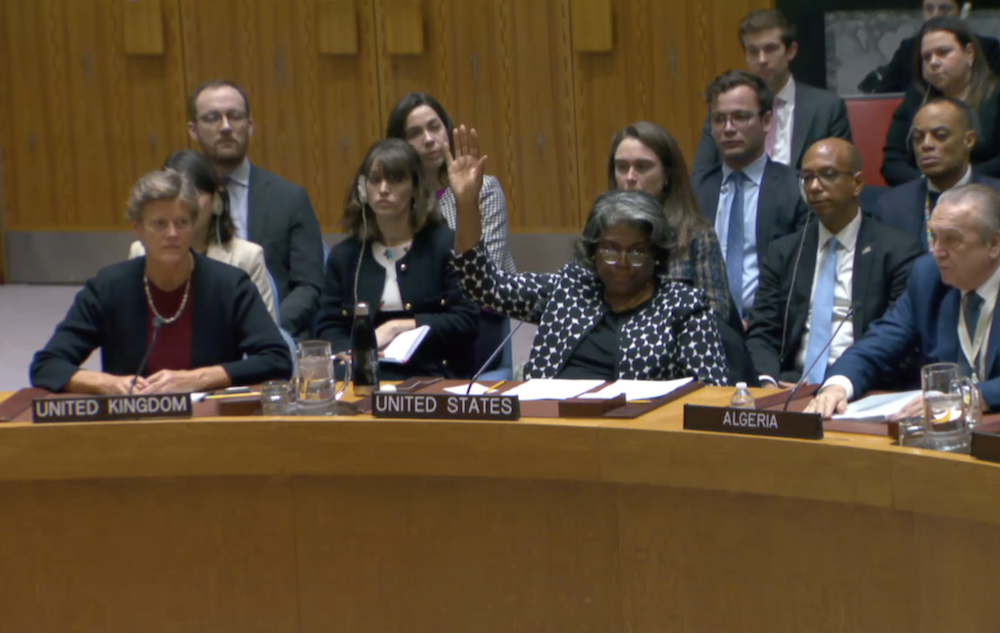NEW YORK CITY: For the fourth time since the start of the war in Gaza, the US on Tuesday vetoed a draft UN Security Council resolution demanding an immediate ceasefire in the embattled territory.
It said such a resolution would interfere with ongoing, “sensitive” negotiations, led by Washington, that are attempting to broker an end to the hostilities.
Thirteen of the 15 council members voted in favor of the resolution, which was drafted by Algeria. The UK abstained.

Linda Thomas-Greenfield, the US permanent representative to the UN, described Tuesday’s vote as “irresponsible.” (Screenshot/UNTV)
“This resolution is a stance against the advocates of murder and hatred,” Algeria’s ambassador to the UN, Amar Bendjama, told the council prior to the vote.
“A vote in favor of this draft resolution is support to the Palestinians’ right to life. Conversely, voting against it implies an endorsement of the brutal violence and collective punishment inflicted upon them.
“Today, every Palestinian is a target of death, extermination and genocide. How many innocent lives must be sacrificed before the council deems it necessary to call for a ceasefire?”
More than 29,000 Palestinians have been killed in Gaza since Israeli forces began their bombardment in the aftermath of the Oct. 7 attacks by Hamas, according to the territory’s Health Ministry. About 70,000 have been injured, and thousands of bodies are thought to be still buried under the rubble of destroyed buildings.
After the vote, Bendjama vowed that he will continue to knock on the door of the Security Council demanding an end to the bloodshed in Gaza. “We will never tire and we will never stop,” he added.
Linda Thomas-Greenfield, the US permanent representative to the UN, described Tuesday’s vote as “irresponsible.”
She signaled on Saturday that Washington would block the draft resolution over concerns it could jeopardize ongoing negotiations to broker a pause in the fighting and the release of the remaining Israeli hostages held by Hamas and other groups in the Gaza Strip.
“Any action this council takes right now should help not hinder these sensitive and ongoing negotiations,” she said before the vote, warning that the Algerian resolution would only hamper those talks.
“Demanding an immediate, unconditional ceasefire without an agreement requiring Hamas to release the hostages will not bring about a durable peace. Instead, it could extend the fighting between Hamas and Israel.”
In addition to the call for an immediate ceasefire, the Arab-backed draft resolution did also demand the immediate release of all hostages. It also rejected the forced displacement of Palestinian civilians, called for the unrestricted flow of humanitarian aid to the people of Gaza, and reiterated council demands that both Israel and Hamas “scrupulously comply” with the rules of international law, especially in relation to the protection of civilians. It also condemned “all acts of terrorism,” without explicitly naming either side.
In a surprise move on Sunday night, the US tabled its own alternative draft resolution on Gaza that also called for a “ceasefire” but referred to it as a temporary one to be implemented “as soon as practicable” and “based on the formula of all hostages being released.”
The US draft, a copy of which Arab News obtained, also underscored the demand that Israel should not proceed with a military offensive against the city of Rafah in southern Gaza, on the grounds that such an attack “would result in further harm to civilians and their further displacement, including potentially into neighboring countries, which would have serious implications for regional peace and security.”
Rafah has become the last refuge for more than a million Palestinians forced to flee fighting in other parts of Gaza.
Discussions of the US draft resolution, which diplomatic sources said has not been officially presented to Security Council members, have yet to take place and there is no timetable as yet for any vote on it.
However, the sources said that based on media reports, the text of the resolution appears to be too wordy, and they have concerns about the wording of the ceasefire call, especially the reference to it being a temporary measure to be implemented “as soon as practicable,” without specifying who will decide when this might be. This suggests the US will leave it up to Israel to decide when a ceasefire declaration is appropriate, they said.
Russia’s permanent representative to the UN, Vassily Nebenzia, described the failure to adopt the Algerian resolution as “yet another dark chapter in the history of the UN Security Council, again written by the US delegation.”
He accused the Americans of providing cover for Israel to carry out “inhumane plans against Gaza, specifically to expel the Palestinians from the strip and to completely cleanse the strip and quite literally transform it into an uninhabitable territory.”
The magnitude of the violence unleashed in Gaza “has surpassed any conflict humankind has encountered following the Second World War. Public opinion will no longer forgive UN inaction,” he added.
China’s envoy, Zhang Jun, also expressed disappointment about the outcome of the vote. He said the US veto sends the wrong message and pushes the situation in Gaza in a dangerous direction.
“The continued passive avoidance of an immediate ceasefire is nothing different from giving a green light to the continued slaughter,” he said.
While ceasefire resolutions are being vetoed in the Security Council, Zhang said, the spillover from the conflict continues to destabilize the entire Middle East region, increasing the risk of a wider war.
“Only by extinguishing the flames of war in Gaza can we prevent fires of hell from engulfing the entire region,” he added. “The council must act quickly to stop this carnage in the Middle East.”
Slovenia’s Samuel Zbogar, who voted in favor of the resolution, called for an end to the killing of civilians in Gaza.
“The suffering that Palestinians are enduring is beyond anything a human being should be subjected to,” he said.



























